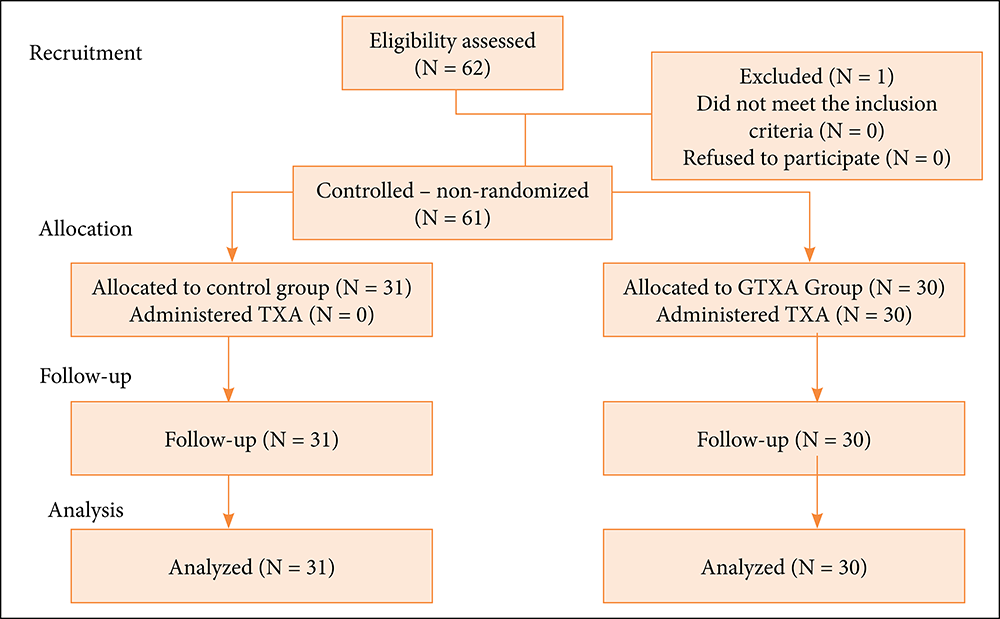Rosa Emilia Moraes, Scientific journalist at Linceu Editorial, São José dos Campos, SP, Brasil.
Currently , long-term data demonstrate the effectiveness of bariatric surgery as a strategy for managing weight loss and reducing mortality and morbidity rates among obese patients (TEMPERLEY et al., 2021).
, long-term data demonstrate the effectiveness of bariatric surgery as a strategy for managing weight loss and reducing mortality and morbidity rates among obese patients (TEMPERLEY et al., 2021).
Laparoscopic sleeve gastrectomy (LSG) is a bariatric surgery considered safe and technically more straightforward than gastric bypass. Although the expected volume of blood loss from a bariatric patient is not ordinarily high, bleeding complications are the most feared. In the LSG technique, one of the main risks is anastomosis, such as bleeding and chronic fistula formation due to complications in the stapling line (RAMOS et al., 2015).
In an article Tranexamic acid effects in postoperative bleeding outcomes in laparoscopic sleeve gastrectomy: a controlled study, published in Acta Cirúrgica Brasileira (vol. 37, no. 7, 2022), a clinical investigation attested to the advantages of using tranexamic acid to reduce the hemorrhagic effect in the context of bariatric surgery of the type laparoscopic sleeve gastrectomy. The research was carried out from January 2019 to June 2020 at the Center for Bariatric and Metabolic Surgery at Hospital São Domingos, São Luís (MA), Brazil, with scientists from the Universidade Federal do Maranhão.

Image: article.
Figure 1. Flowchart of the patient analysis. GTXA = group of patients who received tranexamic acid.
With a technical description of the procedures used and the methodology applied to the data collection and analysis presented, the study proves the reductions in blood loss in the intraoperative and postoperative period without bleeding complications, evidenced in the highest values indicated in hematocrit (HCT) and in the lowest hospital stay time.
The information obtained leads to the conclusion that tranexamic acid is an advantageous and clinically safe procedure since recorded no thromboembolic event during the research. It is also a low-cost and fast-performing method, which can reduce the length of stay in the hospital environment and prevent serious complications.
The study analyzed a total of 61 patients between 18 and 65 years old, who underwent laparoscopic sleeve gastrectomy bariatric surgery, selected, and divided into two groups: GTXA, the group that received tranexamic acid intravenously during anesthesia, and the Control Group (CG), in which there was no such intervention. Both groups followed the same anesthesia and thromboprophylaxis protocols.
The results are arranged in tables and flowcharts covering the characteristics of patients and comparative data between both groups at each stage of the research.
References
RAMOS, A.C., et al. Technical aspects of laparoscopic sleeve gastrectomy. ABCD, arq. bras. cir. dig. [online]. 2015, vol. 28, no. Suppl 1, pp. 65-68 [viewed 23 November 2022], . https://doi.org/10.1590/S0102-6720201500S100018. Available from: https://www.scielo.br/j/abcd/a/WWtMswvvPs4T7Pr87WPH3Ym/
TEMPERLEY, L, SULLIVAN, A. and ARUCHUNA, R. Bariatric surgery and the endoscopist. Frontline Gastroenterology [online]. 2021, vol. 12, no. 7, pp. 683-689 [viewed 23 November 2022]. https://doi.org/10.1136/flgastro-2020-101681. Available from: https://fg.bmj.com/content/12/7/683
To read the article, access
BRITO, R.M., et al. Tranexamic acid effects in postoperative bleeding outcomes in laparoscopic sleeve gastrectomy: a controlled study. Acta Bras Cir [online]. 2022, vol. 37, no. 7, e370702 [viewed 23 November 2022]. https://doi.org/10.1590/acb370702. Available from: https://www.scielo.br/j/acb/a/WGC6BWDRJPR9D9hcZrvxFBd/
External links
Acta Cirúrgica Brasileira – ACB: https://www.scielo.br/j/acb/
Universidade Federal do Maranhão (UFMA): https://portalpadrao.ufma.br/site
Hospital São Domingos (HSD): https://www.hospitalsaodomingos.com.br/
Como citar este post [ISO 690/2010]:


















Recent Comments